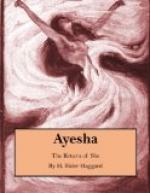Leo, whom this new gospel of regeneration seemed to appall, who was, in fact, a hater of absolute monarchies and somewhat republican in his views and sympathies, continued the argument, but I took no further heed. The thing was grotesque in its tremendous and fantastic absurdity; Ayesha’s ambitions were such as no imperial-minded madman could conceive.
Yet—here came the rub—I had not the slightest doubt but that she was well able to put them into practice and carry them to some marvellous and awful conclusion. Why not? Death could not touch her; she had triumphed over death. Her beauty—that “cup of madness” in her eyes, as she named it once to me—and her reckless will would compel the hosts of men to follow her. Her piercing intelligence would enable her to invent new weapons with which the most highly-trained army could not possibly compete. Indeed, it might be as she said, and as I for one believed, with good reason, it proved, that she held at her command the elemental forces of Nature, such as those that lie hid in electricity, which would give all living beings to her for a prey.
Ayesha was still woman enough to have worldly ambitions, and the most dread circumstance about her superhuman powers was that they appeared to be unrestrained by any responsibility to God or man. She was as we might well imagine a fallen angel to be, if indeed, as she herself once hinted and as Atene and the old Shaman believed, this were not her true place in creation. By only two things that I was able to discover could she be moved—her love for Leo and, in a very small degree, her friendship for myself.
Yet her devouring passion for this one man, inexplicable in its endurance and intensity, would, I felt sure even then, in the future as in the past, prove to be her heel of Achilles. When Ayesha was dipped in the waters of Dominion and Deathlessness, this human love left her heart mortal, that through it she might be rendered harmless as a child, who otherwise would have devastated the universe.
I was right.
Whilst I was still indulging myself in these reflections and hoping that Ayesha would not take the trouble to read them in my mind, I became aware that Oros was bowing to the earth before her.
“Thy business, priest?” she asked sharply; for when she was with Leo Ayesha did not like to be disturbed.
“Hes, the spies are returned.”
“Why didst thou send them out?” she asked indifferently. “What need have I of thy spies?”
“Hes, thou didst command me.”
“Well, their report?”
“Hes, it is most grave. The people of Kaloon are desperate because of the drought which has caused their crops to fail, so that starvation stares them in the eyes, and this they lay to the charge of the strangers who came into their land and fled to thee. The Khania Atene also is mad with rage against thee and our holy College. Labouring night and day, she has gathered two great armies, one of forty, and one of twenty thousand men, and the latter of these she sends against the Mountain under the command of her uncle, Simbri the Shaman. In case it should be defeated she purposes to remain with the second and greater army on the plains about Kaloon.”




